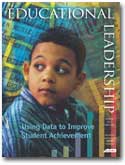A Profound Statement
Just when I had given up hope on Diane Ravitch as a centrist writer, up comes “September 11: Seven Lessons for the Schools.” Congratulations for printing her profound statement as the lead article in Educational Leadership (Oct. 2002). Please disseminate her lessons to every state education journal, to all news organizations, and even the NEA.
—Donald C. Orlich, Washington State University, Pullman, Washington
Saddened by U.S. Actions
It was really sad to see Diane Ravitch's article as the first article of this issue (Oct. 2002). Do you really promote what she says in the article?
Having been involved in global education since the early 1980s, I believe that this field seems to be going backward rather than forward; there haven't been too many interesting materials around in the past 10 years or so.
I am very sorry for the tragic incidents that happened on Sept. 11, 2001, but I am also very sorry for what the United States has been doing since Sept. 11, both internally and externally. Now, I have to add this article to my list.
—Shin Yoshida, Japan
Most Effective Treatment for Bipolar Children
I am a psychoanalyst who read the essay, “An Explosive Debate: The Bipolar Child” (Nov. 2002). I take exception to Dr. Schlozman's characterization that medication and “behavior therapy” with an “empathic” counselor have been found to be the most effective way of dealing with these children. I'm sure these approaches have been found effective by those who use them, but to my knowledge no studies show Schlozman's suggested approach to be superior to a psychoanalytic one. In fact, there probably is not even a designable unbiased study of this type, given the nonempirical, highly deductive way that psychoanalysis collects its knowledge and treats patients.
—Joseph Scalia, Stockett, Montana
More Global Questions
I am fascinated with the ideas in “The World Is With Us” (Perspectives, Oct. 2002). The questions are most important: What are the best ways to teach about other cultures? What do we teach students about the world? Can we teach both patriotism and international understanding?
I would like to add the following questions: Have Americans the same values as other citizens of the Western World? What are the questions we should be asking about world ethics?
—Gottfried Kleinschmidt, Professor of Education, Leonberg, Germany
Error in Number of Deaths at Gettysburg
“Guiding the Innate Constructivist” (Geoffrey Caine, Renate Nummela Caine, and Carol McClintic, Sept. 2002) describes a constructivist exercise on the battle of Gettysburg and explains howTeachers displayed data about the battle at Gettysburg on the overhead citing 51,000 deaths that resulted from three days of fighting, a total that exceeds the number of U.S. soldiers who died in the Vietnam War.
Historians agree that there were more than 50,000 casualties at the battle of Gettysburg, defined as the total number of those killed, wounded, or missing. The total number of deaths in that three-day battle was closer to 8,000. Further, statistics show that more than 58,000 Americans died in the Vietnam War, and casualties numbered in the hundreds of thousands. For this article to state that there were more Americans killed at the battle of Gettysburg than during the entire Vietnam War is wrong and misleading.
—Denis O'Rourke, Social Studies Chair Hommocks School, Larchmont, New York
The Authors Reply
We agree that the sentence should have read,The teachers then displayed data about the battle at Gettysburg on another overhead, citing, for example, the 51,000 casualties that resulted from three days of fighting, a total approximating the number of U.S. soldiers who died in the Vietnam War.
—Geoffrey Caine and Renate Nummela Caine, Idyllwild, California
—Carol McClintic, Canyon Middle School, Yucaipa, California
Call for Manuscripts
EL announces its themes for 2003–2004 on p. 90. We look for features describing research-based solutions to current problems in education; opinion pieces that interweave experiences, ideas, and reasoned debate on controversial subjects; and program descriptions (school, district, or state). Manuscripts should be brief (1,500–2,500 words) and helpful to practicing preK–12 educators.
Please send manuscripts to Marge Scherer, Editor in Chief Educational Leadership ASCD 1703 North Beauregard Street Alexandria, VA 22311-1714

